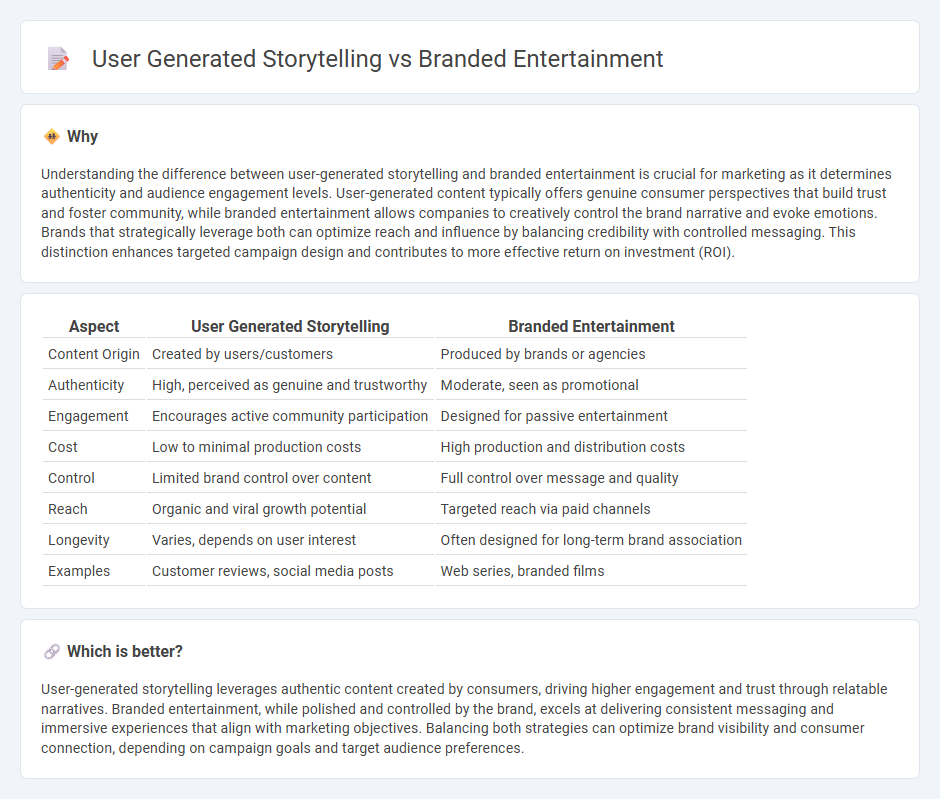
User-generated storytelling harnesses authentic consumer experiences to build trust and foster community engagement around a brand. Branded entertainment strategically blends storytelling with promotional content to create immersive brand narratives that captivate audiences. Explore how these approaches can amplify your marketing impact by learning more.
Why it is important
Understanding the difference between user-generated storytelling and branded entertainment is crucial for marketing as it determines authenticity and audience engagement levels. User-generated content typically offers genuine consumer perspectives that build trust and foster community, while branded entertainment allows companies to creatively control the brand narrative and evoke emotions. Brands that strategically leverage both can optimize reach and influence by balancing credibility with controlled messaging. This distinction enhances targeted campaign design and contributes to more effective return on investment (ROI).
Comparison Table
| Aspect | User Generated Storytelling | Branded Entertainment |
|---|---|---|
| Content Origin | Created by users/customers | Produced by brands or agencies |
| Authenticity | High, perceived as genuine and trustworthy | Moderate, seen as promotional |
| Engagement | Encourages active community participation | Designed for passive entertainment |
| Cost | Low to minimal production costs | High production and distribution costs |
| Control | Limited brand control over content | Full control over message and quality |
| Reach | Organic and viral growth potential | Targeted reach via paid channels |
| Longevity | Varies, depends on user interest | Often designed for long-term brand association |
| Examples | Customer reviews, social media posts | Web series, branded films |
Which is better?
User-generated storytelling leverages authentic content created by consumers, driving higher engagement and trust through relatable narratives. Branded entertainment, while polished and controlled by the brand, excels at delivering consistent messaging and immersive experiences that align with marketing objectives. Balancing both strategies can optimize brand visibility and consumer connection, depending on campaign goals and target audience preferences.
Connection
User-generated storytelling enhances branded entertainment by providing authentic content that resonates with audiences and drives engagement. This organic narrative approach leverages consumers' personal experiences, creating emotional connections that amplify brand presence within entertainment formats. Integrating user stories into branded content increases credibility and fosters community, boosting marketing effectiveness.
Key Terms
Content Integration
Branded entertainment seamlessly integrates promotional content within engaging narratives, enhancing brand recall without disrupting viewer experience. User-generated storytelling features authentic, consumer-created content that fosters trust and community engagement through organic brand integration. Explore the advantages and strategies of content integration in both approaches to optimize your marketing efforts.
Audience Engagement
Branded entertainment leverages professional content creation to craft immersive narratives that enhance audience engagement through high production value and strategic messaging. User-generated storytelling fosters authentic interactions, driving deeper emotional connections and increased trust by empowering audiences to share their personal experiences. Explore how combining these approaches can maximize audience engagement and brand loyalty.
Authenticity
Branded entertainment often emphasizes polished storytelling crafted by professionals, but it may lack the genuine authenticity found in user-generated content, which resonates through real, unfiltered experiences. User-generated storytelling builds trust and emotional connection by showcasing diverse perspectives and spontaneous moments, enhancing brand credibility. Explore how leveraging authentic user narratives can transform your marketing strategy and deepen audience engagement.
Source and External Links
Branded content - Branded content, also known as branded entertainment, is a form of entertainment funded by advertisers to build brand awareness through content that reflects the brand's values and image.
Branded Entertainment: What It Is and How to Achieve It - This article discusses how branded entertainment goes beyond product placement by focusing on entertaining audiences while integrating the brand, highlighting examples like "The Lego Movie" and offering strategies for effective implementation.
Branded Entertainment Is Shaping the Future of Advertising - This article explores how branded entertainment is transforming advertising by offering deeper consumer engagement, emotional storytelling, and long-term brand loyalty, emphasizing the importance of creativity and effective production.
 dowidth.com
dowidth.com